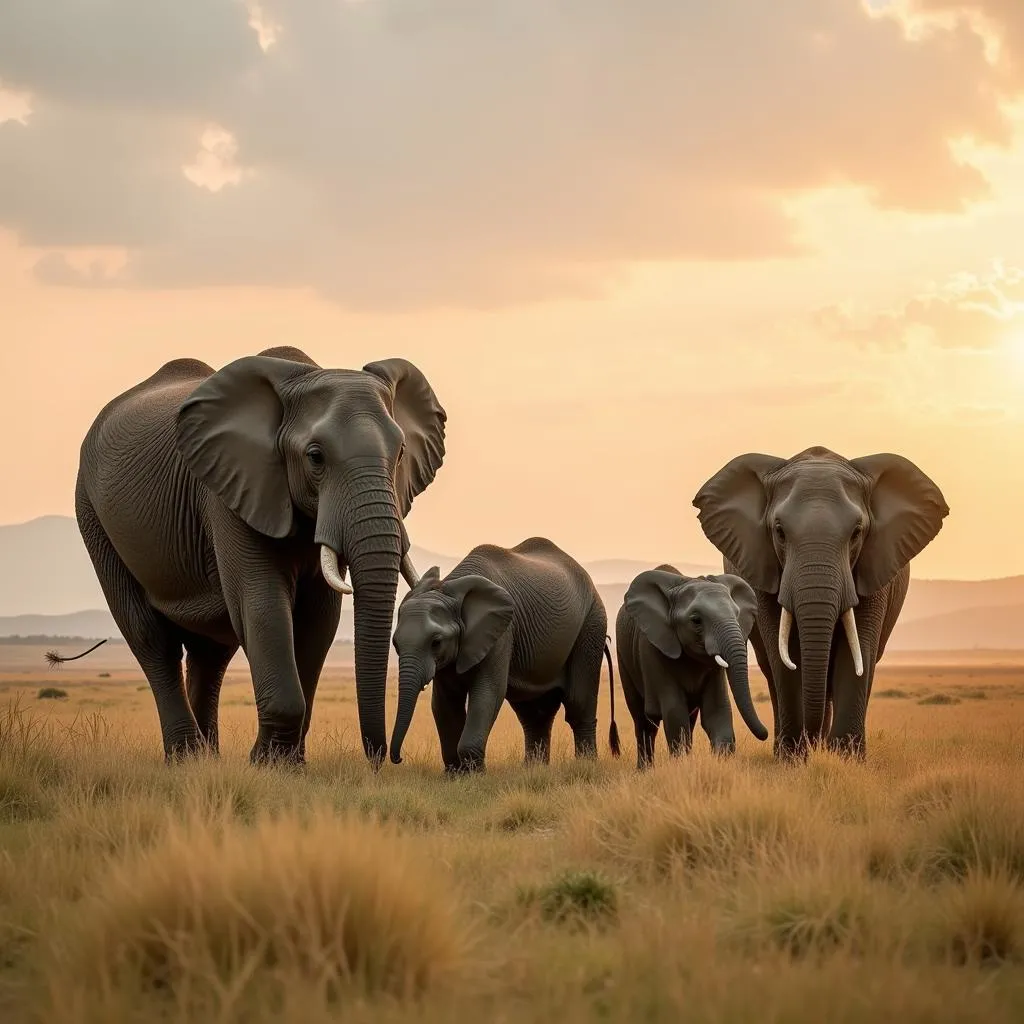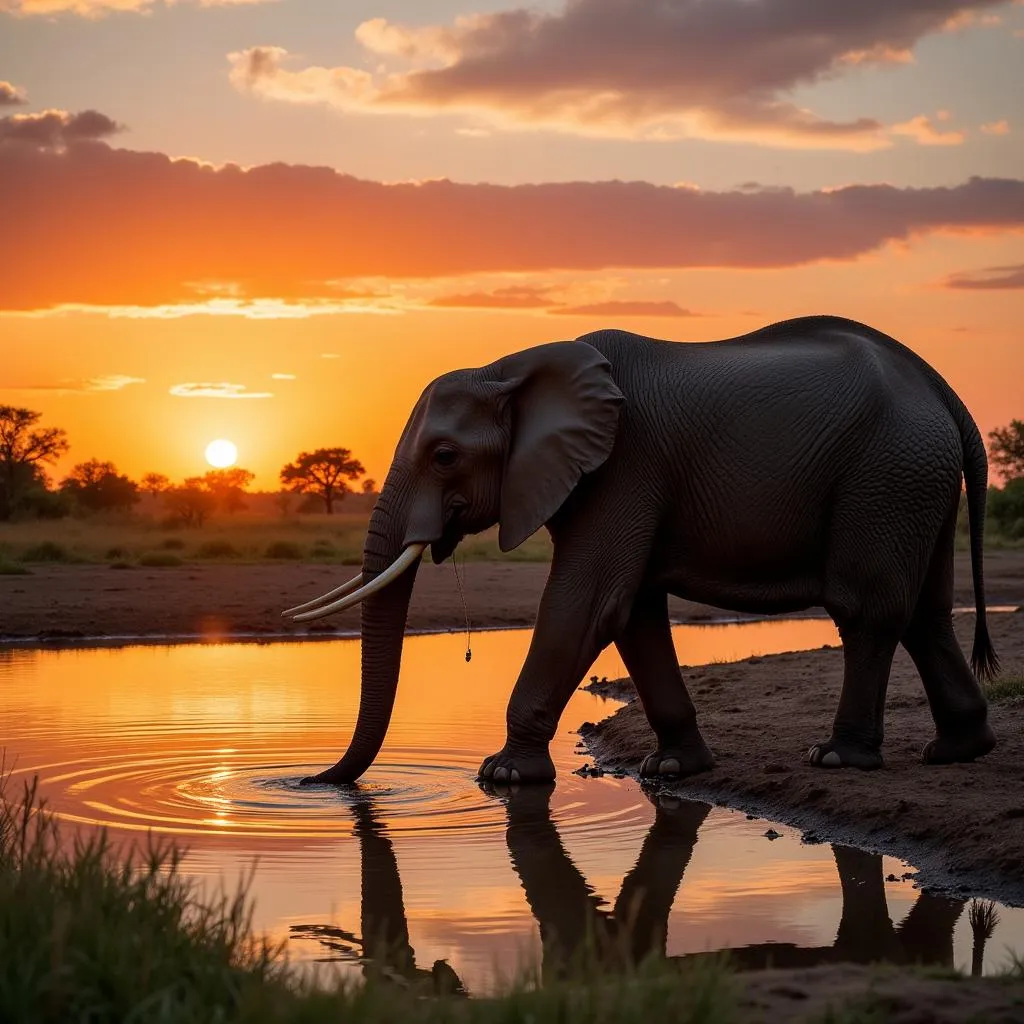The Urgent Need for African Elephant Conservation Funds
African Elephant Conservation Funds are crucial for the survival of these magnificent creatures across the African continent. Facing numerous threats, from habitat loss to poaching, African elephants are in dire need of our support. These funds directly impact the survival of these gentle giants and the preservation of the African wilderness for generations to come.
Understanding the Plight of African Elephants
African elephants, both the savanna and forest subspecies, play a vital role in maintaining the balance of their ecosystems. They are natural engineers, creating clearings that benefit other species and promoting plant diversity through their feeding habits. However, these keystone species are facing an unprecedented crisis.
The Devastating Impact of Poaching
One of the most significant threats to African elephants is poaching for their ivory tusks. Despite international bans on the ivory trade, illegal markets persist, fueling demand and driving the slaughter of thousands of elephants each year. The consequences are devastating, not only for elephant populations but also for the communities that depend on them and the ecosystems they support.
Habitat Loss and Human-Wildlife Conflict
As human populations grow and expand, elephant habitats shrink. This encroachment leads to habitat fragmentation, forcing elephants into closer contact with humans. This proximity often results in human-wildlife conflict, with crops being raided and, in some cases, human lives lost. Such conflicts often lead to retaliatory killings of elephants, further exacerbating their plight.
 African Elephant Family Grazing Savannah
African Elephant Family Grazing Savannah
How African Elephant Conservation Funds Make a Difference
Dedicated organizations and individuals work tirelessly to protect African elephants. African elephant conservation funds are the lifeblood of these efforts, providing essential resources for a multi-faceted approach to conservation.
Anti-Poaching Initiatives and Law Enforcement
A significant portion of conservation funds goes toward strengthening anti-poaching patrols, improving surveillance technology, and training rangers to combat poaching effectively. These initiatives are crucial in deterring poachers, dismantling trafficking networks, and bringing perpetrators to justice.
Habitat Protection and Restoration
Protecting existing elephant habitats and restoring degraded areas is vital for the long-term survival of these animals. Conservation funds support land acquisition, community conservation initiatives, and efforts to mitigate human-wildlife conflict, ensuring elephants have safe spaces to roam and thrive.
Research and Monitoring
Understanding elephant populations, their movements, and the threats they face is essential for developing effective conservation strategies. Funds are used to support research projects that monitor elephant populations, study their behavior, and assess the impact of conservation interventions.
 African Elephant Drinking at Waterhole During Sunset
African Elephant Drinking at Waterhole During Sunset
Supporting African Elephant Conservation
Every individual can contribute to the protection of African elephants. Here are some ways to get involved:
- Donate to reputable African elephant conservation organizations. Your financial support directly contributes to anti-poaching efforts, habitat protection, and community-based conservation programs.
- Spread awareness about the plight of African elephants. Share information about the threats they face and the importance of conservation with your friends, family, and social networks.
- Support sustainable tourism initiatives. Choose tour operators committed to responsible wildlife viewing practices that prioritize elephant welfare and conservation.
The Future of African Elephants: A Collective Responsibility
The fate of African elephants hangs in the balance. However, with increased awareness, unwavering support, and sustained conservation efforts, we can ensure these majestic creatures continue to roam the African plains for generations to come. Let us join hands to protect these gentle giants and preserve the natural heritage of Africa.
Frequently Asked Questions (FAQ)
1. How many species of African elephants are there?
There are two recognized species of African elephants: the African bush elephant (Loxodonta africana) and the African forest elephant (Loxodonta cyclotis).
2. What is being done to stop elephant poaching?
Efforts to combat poaching include strengthening anti-poaching patrols, using advanced surveillance technology, training and equipping rangers, and working to reduce demand for ivory.
3. How can I support African elephant conservation?
You can support conservation by donating to reputable organizations, raising awareness about their plight, and supporting sustainable tourism initiatives.
4. Are African elephants endangered?
Yes, both African bush elephants and African forest elephants are classified as endangered on the IUCN Red List.
5. What is the role of African elephants in their ecosystems?
African elephants are keystone species, playing a crucial role in maintaining the balance of their ecosystems by creating clearings, dispersing seeds, and influencing plant diversity.
You can explore more about African wildlife conservation through these related articles:
- African Animal Census
- African Bear
- African Elephant Endangered Animals WWF
- African Elephant Silhouette Sunset
- African Conservation Centre
For further assistance and inquiries, please contact:
Phone Number: +255768904061
Email: kaka.mag@gmail.com
Address: Mbarali DC Mawindi, Kangaga, Tanzania
Our dedicated customer support team is available 24/7 to address your needs.


